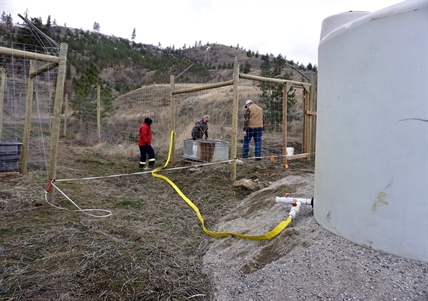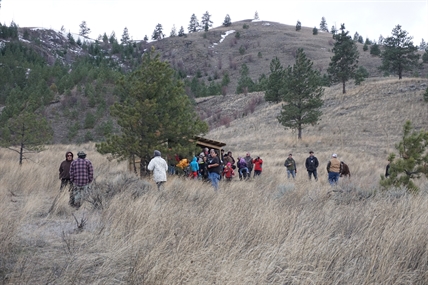Elevate your local knowledge
Sign up for the iNFOnews newsletter today!
Sign up for the iNFOnews newsletter today!
Selecting your primary region ensures you get the stories that matter to you first.

PENTICTON – A project to treat a disease threatening the bighorn sheep population in the South Okanagan is underway.
The Penticton Indian Band’s natural resources department is teaming up with the University of Saskatchewan and the Ministry of Forests, Lands and Natural Resource Operations to treat the area’s bighorn sheep for Psoroptic mange, or sheep mange, according to a media release.
Penticton Indian Band ecologist Cailyn Glasser says 18 bighorn sheep are being treated for disease at an enclosure built on ten acres of Penticton Indian Band land. The 2.4 metre high fence with a one metre overhang will isolate the sheep while they are being treated.
The sheep are treated with an injection normally used to treat parasites in cattle herds, University of Saskatchewan PhD student Adam Hering says. The sheep are being quarantined in order to maintain treatment schedules and conduct medical evaluations without adding undue stress to the herd.

The project involves several different agencies, bringing together donors and volunteers, the release says. Many organizations have contributed money and supplies, including the Wild Sheep Society of B.C., the Guide Outfitters of B.C., and the Wild Sheep Foundation, among others. A year’s worth of feed was donated by Brad and Alisa Siemens, and Gary Warren contributed a number of hours to pen construction, sheep capture and caretaking.
Penticton Indian Band members, youth and students are proving to be committed caretakers, feeding and checking on the sheep on a daily basis, the release states.
Psoroptic mange was discovered in the bighorn sheep population in the Similkameen Valley in 2011. The disease causes hair to fall out, resulting in scaly crusts that may spread to other parts of the body. The generally results in crusty, clogged ears but occasionally it can cause hair to fall out, resulting in scaly crusts that may spread to other parts of the body. In rare cases, the animals lose weight and appetite, resulting in emaciation.
The province is working to ensure the infected herds don’t have an opportunity to interact with healthier populations on the east side of the Okanagan Valley by creating a buffer zone between the Similkameen and Okanagan herds in the McIntyre Bluff area.

To contact a reporter for this story, email Steve Arstad or call 250-488-3065 or email the editor. You can also submit photos, videos or news tips to the newsroom and be entered to win a monthly prize draw.
We welcome your comments and opinions on our stories but play nice. We won't censor or delete comments unless they contain off-topic statements or links, unnecessary vulgarity, false facts, spam or obviously fake profiles. If you have any concerns about what you see in comments, email the editor in the link above.
News from © iNFOnews.ca, . All rights reserved.
This material may not be published, broadcast, rewritten or redistributed.

This site is protected by reCAPTCHA and the Google Privacy Policy and Terms of Service apply.
Want to share your thoughts, add context, or connect with others in your community?
You must be logged in to post a comment.